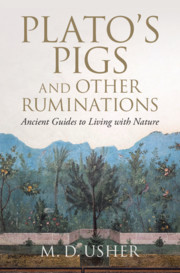Book contents
- Plato’s Pigs and Other Ruminations
- Plato’s Pigs and Other Ruminations
- Copyright page
- Epigraph
- Contents
- Figures
- Preface
- Note on Sources and Citation
- Introduction
- Chapter 1 Debts to Nature
- Chapter 2 Anaximander for the Anthropocene
- Chapter 3 Heraclitus and the Quantum
- Chapter 4 A City for Pigs
- Chapter 5 Mutual Coercion, Mutually Agreed Upon
- Chapter 6 Cynics and Stoics
- Chapter 7 Roman Revolutions
- Chapter 8 Community Rule
- Afterword Works & Days and Then Some
- Notes
- Index
Chapter 3 - Heraclitus and the Quantum
Published online by Cambridge University Press: 26 September 2020
- Plato’s Pigs and Other Ruminations
- Plato’s Pigs and Other Ruminations
- Copyright page
- Epigraph
- Contents
- Figures
- Preface
- Note on Sources and Citation
- Introduction
- Chapter 1 Debts to Nature
- Chapter 2 Anaximander for the Anthropocene
- Chapter 3 Heraclitus and the Quantum
- Chapter 4 A City for Pigs
- Chapter 5 Mutual Coercion, Mutually Agreed Upon
- Chapter 6 Cynics and Stoics
- Chapter 7 Roman Revolutions
- Chapter 8 Community Rule
- Afterword Works & Days and Then Some
- Notes
- Index
Summary
Heraclitus’s doctrine of a cosmogonic unity of opposites held together in harmoniēis the topic of “Heraclitus and the Quantum.” Like Anaximander, Heraclitus posits a self-organizing universe in which objects and agents interact to form relational wholes. It is argued that Heraclitus’s ideas anticipate physicist Niels Bohr’s atomic theory of complementarity and the systems thinking of early cyberneticists. Extended from a description of the cosmos to a prescription for living, Heraclitean harmoniē, it is argued, is tantamount to sustainability, and provides a profounder, more durable alternative to some modern prescriptions circulating under the same conceptual umbrella.
Keywords
Information
- Type
- Chapter
- Information
- Plato's Pigs and Other RuminationsAncient Guides to Living with Nature, pp. 64 - 90Publisher: Cambridge University PressPrint publication year: 2020
